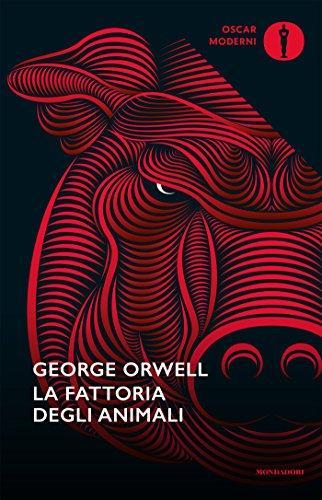Stefkus ha recensito Farm der Tiere di George Orwell
Farm der Tiere
4 stelle
"Alle Tiere sind gleich aber manche sind gleicher"

lingua Italian
Pubblicato il 21 Settembre 2016
Animal Farm is a beast fable, in form of satirical allegorical novella, by George Orwell, first published in England on 17 August 1945. It tells the story of a group of farm animals who rebel against their human farmer, hoping to create a society where the animals can be equal, free, and happy. Ultimately, the rebellion is betrayed, and the farm ends up in a state as bad as it was before, under the dictatorship of a pig named Napoleon. According to Orwell, Animal Farm reflects events leading up to the Russian Revolution of 1917 and then on into the Stalinist era of the Soviet Union. Orwell, a democratic socialist, was a critic of Joseph Stalin and hostile to Moscow-directed Stalinism, an attitude that was critically shaped by his experiences during the May Days conflicts between the POUM and Stalinist forces during the Spanish Civil War. In a letter to …
Animal Farm is a beast fable, in form of satirical allegorical novella, by George Orwell, first published in England on 17 August 1945. It tells the story of a group of farm animals who rebel against their human farmer, hoping to create a society where the animals can be equal, free, and happy. Ultimately, the rebellion is betrayed, and the farm ends up in a state as bad as it was before, under the dictatorship of a pig named Napoleon. According to Orwell, Animal Farm reflects events leading up to the Russian Revolution of 1917 and then on into the Stalinist era of the Soviet Union. Orwell, a democratic socialist, was a critic of Joseph Stalin and hostile to Moscow-directed Stalinism, an attitude that was critically shaped by his experiences during the May Days conflicts between the POUM and Stalinist forces during the Spanish Civil War. In a letter to Yvonne Davet, Orwell described Animal Farm as a satirical tale against Stalin ("un conte satirique contre Staline"), and in his essay "Why I Write" (1946), wrote that Animal Farm was the first book in which he tried, with full consciousness of what he was doing, "to fuse political purpose and artistic purpose into one whole".The original title was Animal Farm: A Fairy Story, but US publishers dropped the subtitle when it was published in 1946, and only one of the translations during Orwell's lifetime, the Telugu version, kept it. Other titular variations include subtitles like "A Satire" and "A Contemporary Satire". Orwell suggested the title Union des républiques socialistes animales for the French translation, which abbreviates to URSA, the Latin word for "bear", a symbol of Russia. It also played on the French name of the Soviet Union, Union des républiques socialistes soviétiques.Orwell wrote the book between November 1943 and February 1944, when the United Kingdom was in its wartime alliance with the Soviet Union against Nazi Germany, and the British intelligentsia held Stalin in high esteem, a phenomenon Orwell hated. The manuscript was initially rejected by a number of British and American publishers, including one of Orwell's own, Victor Gollancz, which delayed its publication. It became a great commercial success when it did appear partly because international relations were transformed as the wartime alliance gave way to the Cold War.Time magazine chose the book as one of the 100 best English-language novels (1923 to 2005); it also featured at number 31 on the Modern Library List of Best 20th-Century Novels, and number 46 on the BBC's The Big Read poll. It won a Retrospective Hugo Award in 1996 and is included in the Great Books of the Western World selection.
"Alle Tiere sind gleich aber manche sind gleicher"
I love George Orwell. This is a beautiful allegory of communism through the eyes of a mid-twentieth century writer. It's not hard to see parallels to our current political situation.
Capolavoro maledettamente evergreen. Fa paura quanto le dinamiche siano sempre attuali.
Una de las mejores analogías que he leído y en este caso, Orwell expone la cruda realidad del comunismo representada en los animales de la granja, donde los cerdos son los líderes del nuevo gobierno (nada mejor representado con los cerdos) y sus víctimas, los animales según el carácter de cada uno de ellos. Un libro recomendado.
L'educazione come arma contro le oppressioni.



